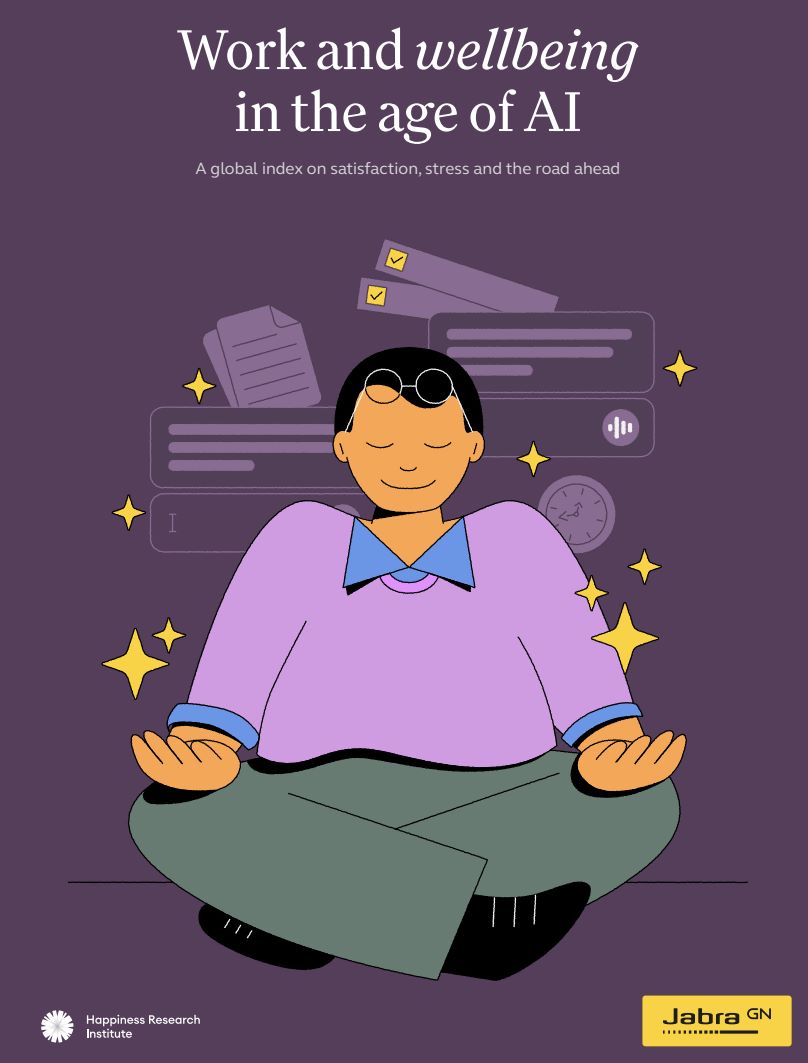India is leading a significant shift in the professional world, where artificial intelligence (AI) is not merely a tool for increased output but a driver of workplace happiness. A new global study by Jabra, conducted in collaboration with the Happiness Research Institute, reveals that India is at the forefront of adopting AI as a catalyst for overall well-being at work. This report, titled “Work and Wellbeing in the Age of AI,” delves into the emotional impact of generative AI on job satisfaction, a sense of purpose, and optimism among employees. The findings indicate a new pattern where individuals who engage with AI daily report higher levels of fulfillment, with India demonstrating leadership in this area.
Key Takeaways:
- India leads 11 surveyed countries in workplace AI readiness.
- Over 81% of Indian workers believe AI will make their jobs more enjoyable, rising to nearly 92% among frequent AI users.
- Over 36% of Indian workers use AI daily in both personal and professional spheres.
- 78% of frequent AI users in India are parents, utilizing AI to streamline tasks.
- Nearly 85% of frequent AI users in India report learning new things at work often.
- 68.6% of Indian companies have integrated AI through training, tools, or strategy.
- Job satisfaction averages 8.5 out of 10 among Indian employees at companies with high AI readiness.
- Indian professionals seek technical AI training (63%), AI literacy programs (58%), and ethical AI guidelines (54%) for AI transition support.
Peter Jayaseelan, Vice President for South Asia & APAC Channels at Jabra, noted that while AI is often discussed in terms of output, in India, it is becoming a powerful driver of emotional engagement. He suggests that the future of work extends beyond just faster outcomes to more meaningful ones.
India’s Human-First AI Approach
Indian professionals are emerging as global leaders in AI adoption, not only in how often they use it but also in their emotional alignment with the technology. More than 36% of Indian workers use AI daily in both their personal and professional lives, which is the highest percentage across all countries surveyed. What truly distinguishes India is the correlation between this AI usage and reported joy at work.
The study indicates that over 81% of Indian workers anticipate AI will make their work more enjoyable. This figure climbs to nearly 92% among frequent AI users. These are the highest satisfaction levels observed globally, suggesting that Indian professionals view AI as a means to shift their focus from routine tasks to more meaningful work.
A detailed look at demographics shows that AI adoption in India is primarily driven by professionals who are most constrained by time. Among frequent AI users in India, 78% are parents, indicating that individuals managing both work and caregiving responsibilities are using AI to streamline tasks and create opportunities for more significant engagement. Beyond just helping with tasks, Indian professionals also link AI use to continuous skill development. Among frequent users, close to 85% report frequently learning new things at work, compared to 77% of infrequent users. This suggests that AI is helping to evolve jobs from routine tasks to dynamic, knowledge-enriching roles.
Organizational Readiness and Optimism
The study also points out that Indian organizations are taking more proactive steps than their global counterparts to support the AI transition. These actions are having a clear impact on employee well-being. A significant 68.6% of Indian workers report that their company has already taken some steps to integrate AI, whether through training programs, providing AI tools, or developing an AI strategy. Among Indian employees working at companies rated 10/10 in AI readiness, job satisfaction averages 8.5 out of 10, with similar high scores for happiness and purpose.
Indian professionals are not just advocating for faster AI integration; they are also seeking thoughtful and ethical adoption. When asked what support would be most beneficial during the AI transition, 63% of respondents emphasized the need for technical AI training. This was closely followed by 58% requesting AI literacy programs and 54% calling for ethical AI guidelines. Nearly half of Indian respondents also asked for greater clarity regarding AI’s impact and its connection to mental well-being.
These findings align with a broader trend observed across the global report: employees who feel included and well-informed in their organization’s AI journey report significantly higher levels of optimism, trust, and engagement.
The Global Context of AI Adoption
While the Jabra study highlights India’s leading position, it’s important to consider the broader global landscape of AI adoption. The integration of AI into workplaces worldwide is a complex process, marked by varying levels of readiness and different cultural approaches. Some nations prioritize output gains, while others, like India, seem to be focusing on the human aspect of AI. This human-centric approach, emphasizing emotional engagement and well-being, could serve as a model for other countries looking to implement AI in a way that fosters a positive work environment.
Public discussions on platforms such as Reddit, Quora, and various online forums often revolve around the practical challenges and benefits of AI. Common questions include how AI can automate mundane tasks, its role in learning and development, and concerns about job displacement. The Jabra study directly addresses some of these points, particularly the idea that AI frees up time for more meaningful work and encourages continuous learning, thereby easing some of the anxieties associated with AI. The finding that AI is particularly beneficial for time-starved professionals, like parents, resonates with many real-world scenarios where individuals seek technological solutions to balance their responsibilities.
Jabra’s Role in AI-Enabled Solutions
Jabra, a brand within the GN Group, specializes in audio, video, and collaboration solutions designed to empower businesses. The company aims to connect people more closely to each other and to what is important to them. GN’s research and development team leverages innovative hardware, software, and AI-enabled technologies, drawing on expertise across hearing, enterprise, and gaming product groups. This engineering strength allows Jabra to develop integrated and customer-focused tools for call centers, offices, and collaboration, helping professionals work more effectively from any location.
Founded in 1869, the GN Group employs over 7,000 people and is listed on Nasdaq Copenhagen (GN.CO). GN’s solutions are sold in 100 countries globally. Jabra’s commitment to understanding the human impact of technology is evident in its collaboration on the “Work and Wellbeing in the Age of AI” report. By exploring the emotional dimensions of AI adoption, Jabra is contributing to a wider understanding of how technology can genuinely improve people’s lives in the workplace. This perspective aligns with the company’s broader mission to create solutions that bring people closer and enhance their experiences.
The Future of Work and Wellbeing
The findings from the Jabra study suggest that the future of work is not solely about technological progress, but equally about the well-being of employees. The ethical considerations surrounding AI, such as the need for transparency and clear guidelines, highlight the importance of responsible AI development and deployment. As AI continues to evolve, organizations will need to prioritize training and literacy programs to ensure that their workforce is equipped to adapt to new tools and processes. The demand for ethical AI guidelines from Indian professionals indicates a desire for AI that is not only powerful but also fair and transparent. This emphasis on human values within AI adoption may very well set a standard for global best practices.
The study offers valuable insights for companies worldwide. By fostering a culture of inclusion and information sharing regarding AI integration, organizations can significantly boost employee optimism, trust, and engagement. This approach moves beyond simply implementing new technologies to creating a supportive environment where employees feel secure and empowered by AI, rather than threatened by it. The proactive steps taken by Indian organizations in providing training, tools, and strategies for AI transition are examples that other nations and companies can follow. This can lead to higher job satisfaction and a greater sense of purpose, ensuring that technological advancements contribute positively to the human experience in the workplace.
India’s approach to AI integration, as highlighted by the Jabra and Happiness Research Institute study, offers a compelling vision of a future where AI enhances not just productivity but also happiness and meaning at work. The high rates of AI adoption, coupled with strong positive emotional responses from Indian professionals, underscore the potential of AI to create more fulfilling work lives. As more companies consider their AI strategies, the Indian model of a human-first, ethically guided, and transparent approach to AI integration stands out as a promising path forward. This aligns with Jabra’s core mission of creating solutions that bring people closer and improve their professional lives. The findings strongly suggest that when AI is implemented with human well-being at its core, it can indeed be a powerful force for good in the workplace.
FAQs
Q1: What is the main finding of the Jabra study regarding AI in India?
A1: The Jabra study found that India leads globally in AI readiness and that Indian professionals report high levels of joy and optimism due to AI integration in their workplaces, viewing AI as a catalyst for wellbeing rather than just a tool for output.
Q2: How frequently do Indian workers use AI according to the study?
A2: Over 36% of Indian workers use AI daily in both their personal and professional lives, which is the highest percentage among all surveyed countries.
Q3: How does AI impact job enjoyment for Indian professionals?
A3: More than 81% of Indian workers believe AI will make their work more enjoyable, with this figure rising to nearly 92% among frequent AI users. This suggests a shift from mundane tasks to more meaningful work.
Q4: Who is primarily driving AI adoption in India?
A4: AI adoption in India is largely driven by time-starved professionals, particularly parents (78% of frequent AI users are parents), who use AI to streamline tasks and make room for more meaningful engagement.
Q5: What kind of support do Indian professionals seek for AI transition?
A5: Indian professionals primarily seek technical AI training (63%), AI literacy programs (58%), and ethical AI guidelines (54%) to support the AI transition in their workplaces.
Q6: How does organizational AI readiness affect employee satisfaction in India?
A6: Among Indian employees working at companies rated 10/10 in AI readiness, job satisfaction averages 8.5 out of 10, with similarly high scores for happiness and purpose.
Q7: What is Jabra’s role in the AI and workplace happiness discussion?
A7: Jabra, a leading brand in audio, video, and collaboration solutions, collaborated on the “Work and Wellbeing in the Age of AI” report to understand the emotional impact of generative AI on job satisfaction, aligning with their mission to empower businesses and bring people closer.



















